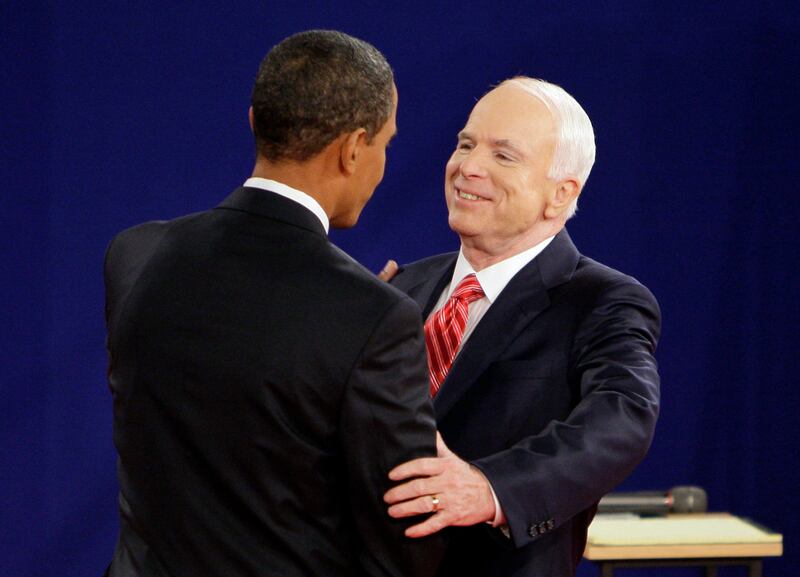Pause for a moment and try to recall the last time you heard politicians speak respectfully about a political foe or acknowledge their contributions.
Quite possibly it was during the 2008 presidential campaign at a town hall meeting in a Minnesota high school, when a woman asked Sen. John McCain a question. “I can’t trust Obama,” she told McCain, “I have read about him, and he’s not, he’s not — he’s an Arab.” Her comment prompted McCain to immediately shake his head and take the microphone from her. “No ma’am,” McCain said. “He’s a decent family man, a citizen that I just happen to have disagreements with on fundamental issues, and that’s what this campaign is all about. He’s not (an Arab).”
Reflecting on the late Republican senator’s bipartisan spirit at that moment one is left with hope for a future day when civility is restored to its proper place in American culture and politics.
It was not a moment forgotten by his political foe. A decade later, on Saturday, Sept. 1, 2018, as millions of Americans listened, former President Barack Obama delivered a moving eulogy in honor of Sen. McCain at Washington’s National Cathedral.
Mr. Obama expressed gratitude for “John pushing back against supporters that challenged my patriotism during the 2008 campaign,” but wasn’t surprised. “I never saw John treat anyone differently because of their race or religion or gender.” In those moments, “he saw himself as defending America’s character, not just mine. He considered it the imperative of every citizen that loves this country to treat all people fairly.”
“John McCain,” former President Obama believed, “understood as JFK understood, as Ronald Reagan understood that part of what makes our country great is that our membership is based not on our blood line, not on what we look like, what our last names are, not based on where our parents or grandparents came from or how recently they arrived, but on adherence to a common creed that all of us are created equal. Endowed by our creator with certain inalienable rights.”
The beloved, widely respected, and esteemed late senator, Mr. Obama emphasized, “cared about the institutions of self-government, our Constitution, our Bill of Rights, rule of law, separation of powers, even the arcane rules and procedures of the senate. He knew that in a nation as big and boisterous and diverse as ours, those institutions, those rules, those norms are what bind us together and give shape and order to our common life, even when we disagree — especially when we disagree.”
As an audience of millions listened to Mr. Obama’s eulogy, he revealed that every so often during his presidency, McCain would stop by the White House and the two of them would sit and talk in the Oval Office about “policy,” “family” and “the state of our politics.” Their real and often deep “disagreements didn’t go away during these private conversations,” but they enjoyed the time “shared away from the bright lights.” They laughed with each other, learned from each other, and “never doubted the other man’s sincerity or the other’s patriotism, or that when all was said and done, (they) were on the same team.”
Sen. McCain was a courageous patriot who was able to find common ground with many who had vastly different philosophies.
Despite their differences, Obama felt they “shared a fidelity to the ideals for which generations of Americans have marched and fought and sacrificed and given their lives.” Both saw America “as a place where anything is possible, and citizenship as an obligation to ensure it forever remains that way.”
John McCain loved a good fight for a good cause and had more than a few spirited and heated encounters with colleagues on both sides of the aisle. Arguing about differences on issues, he believed, was right and necessary. He understood that in America, when the great questions of the day are debated, the minority as well as the majority are heard. Sen. McCain was a courageous patriot who was able to find common ground with many who had vastly different philosophies.
Amidst another election, what better way to emulate what John McCain taught us than by remembering we can disagree but be civil in doing so.
Stephen W. Stathis was a specialist in American history for the Congressional Research Service of the Library of Congress for nearly four decades. He is the author of “Landmark Debates in Congress: From the Declaration of Independence to the War in Iraq,” and “Landmark Legislation: Major U.S. Acts and Treaties, 1774-2012.”

